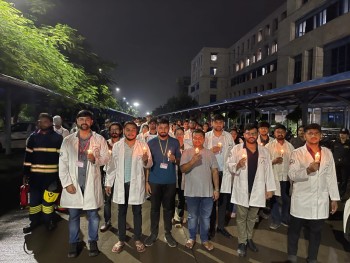Kota, Rajasthan, known as India's premier coaching hub, is experiencing an unprecedented downturn. This city, once bustling with aspiring medical and engineering students, now grapples with a significant decline in enrollments and economic distress. The current situation presents a stark contrast to the city's vibrant past, raising concerns about the future of Kota's coaching industry and highlighting the need for a broader re-evaluation of centralized coaching hubs.
The Decline in Student Enrollments
Recent reports reveal a staggering 40 to 50 percent decrease in student enrollments at Kota's prestigious coaching institutes compared to previous years. This decline has not only impacted the educational landscape but also threatened the livelihoods of many who depend on student patronage. Local businesses, such as bakeries and stationery shops, report halved sales, and many shops have shut down due to fewer students.
For over three decades, Kota has thrived as an educational hotspot, transforming from a small town to a bustling city fueled by its coaching industry. However, this year presents a stark contrast, with many hostels sitting empty and businesses struggling to stay afloat.
Economic Impact
The economic ripple effect of this decline is extensive. Hostel owners who have invested heavily in infrastructure face significant financial strain. While the city once saw lakhs of students arriving annually, this year, the numbers have drastically reduced. This decline has led to massive unemployment, with many people who depended on the influx of students losing their jobs.
Local businesses have experienced a severe drop in sales. Shop owners note that due to the fewer number of students, sales have halved. Many shop owners have vacated their premises. This economic downturn has affected not only shopkeepers but also those involved in ancillary services like laundry, auto-rickshaw drivers, and vegetable vendors.
Causes Behind the Decline
Several factors have contributed to this decline in student numbers:
- Allegations of Malpractices in NEET: The recent NEET exam scandal has significantly impacted parents' trust, leading to a drop in student enrollments in Kota.
- Expansion of Coaching Institutes: Major coaching institutes have expanded to other cities, including those in Uttar Pradesh and Bihar, reducing the concentration of students in Kota.
- Increased Suicide Rates: Rising incidents of student suicides in Kota have deterred parents from sending their children to the city.
- Government Regulations: New regulations preventing the admission of students under 16 years of age have also contributed to the decline.
- Rise of Online Education: The increasing availability and popularity of online education platforms offering free or affordable study materials have reduced the need for students to relocate to Kota for coaching.
The Broader Implications
The current crisis in Kota serves as a classical example for other emerging coaching hubs. Cities experiencing explosive growth in coaching institutes should take note. The challenges faced by Kota highlight the need for these hubs to balance economic growth with the well-being of students.
Kota’s situation underscores the importance of sustainable practices in the coaching industry. The economic downturn and rising student stress levels are clear indicators that the industry must adapt to ensure the safety and success of students.
A Welcome Step for Students and Families
While Kota's concentrated coaching culture has its benefits, providing a studious environment and a competitive spirit, the drawbacks are becoming increasingly apparent. The emotional challenges, rising expenses, and commercialization are taking a toll on students and the local economy. The alarming rate of student suicides is a severe consequence that cannot be overlooked.
By decentralizing coaching institutes, several benefits can be realized:
- Reduced Mental Trauma: With fewer students in each location, teachers can provide more personalized attention, reducing the stress and mental trauma students face.
- Lower Financial Burden: Decentralization can help reduce the exorbitant costs associated with living and studying in Kota. Families will save on hostel fees, travel expenses, and other related costs.
- Increased Access to Online Education: The rise of online education platforms offers a more affordable and accessible alternative to traditional coaching, further reducing the need for students to relocate.
The Way Forward
The decline in Kota’s coaching industry is not just a local issue; it is a reflection of broader systemic problems in the Indian educational landscape. To prevent similar situations in other emerging hubs, stakeholders must focus on creating a supportive environment that addresses the mental health and well-being of students.
Policymakers need to implement regulations that ensure transparency and fairness in competitive exams to restore trust among students and parents. Furthermore, the industry should invest in mental health support systems and counseling services to help students cope with the pressures of competitive exams.
Decentralization and the Rise of Online Education
The current crisis in Kota highlights the need for decentralizing coaching institutes. The monopolistic concentration of coaching centers in one location has significant drawbacks, including emotional and financial burdens on students and their families. Decentralizing these institutes would lead to a more balanced distribution of students, allowing for better teacher-student interaction and reducing mental stress.
Benefits of Decentralization
- Personalized Attention: With fewer students in each location, teachers can provide more individualized attention, addressing students' unique needs and learning styles.
- Reduced Financial Burden: Decentralization would minimize the costs associated with relocating and living in expensive coaching hubs, making quality education more accessible to a broader population.
- Mental Health Support: A more distributed system would allow for better mental health support, as students would not be subjected to the intense pressures of highly competitive environments.
Online Education: A Game Changer
The rise of online education platforms offers a viable alternative to traditional coaching centers. These platforms provide high-quality education at a fraction of the cost, making it accessible to students across the country. Many online educators are offering free or affordable courses, reducing the financial burden on families and providing students with the flexibility to learn at their own pace.
A Wake-Up Call for Emerging Coaching Hubs
The crisis in Kota serves as a wake-up call for other emerging coaching hubs. Cities experiencing rapid growth in coaching institutes must learn from Kota's experience and implement sustainable practices that prioritize student well-being. By adopting a decentralized approach and embracing online education, these hubs can create a supportive and balanced educational environment.
The Importance of Sustainable Practices
Policymakers and educators must work together to implement regulations that ensure transparency and fairness in competitive exams. Investing in mental health support systems and counseling services is crucial to help students cope with the pressures of competitive exams. By fostering a healthy and supportive environment, emerging coaching centers can avoid the pitfalls experienced by Kota.
Conclusion
The decline in Kota’s coaching industry is a reflection of broader systemic issues within the Indian educational landscape. By decentralizing coaching institutes and embracing online education, we can create a more balanced and supportive environment for students. The reforms proposed by the high-level committee and the government’s efforts to address irregularities are steps in the right direction.
As Kota navigates this challenging period, it serves as a reminder of the importance of sustainable practices and student well-being. By learning from Kota's experience, emerging coaching hubs can implement best practices that ensure a brighter and more sustainable future for India's educational sector. Through collective efforts, we can create an educational environment that fosters growth, well-being, and success for all students.











Recent comments
Latest Comments section by users